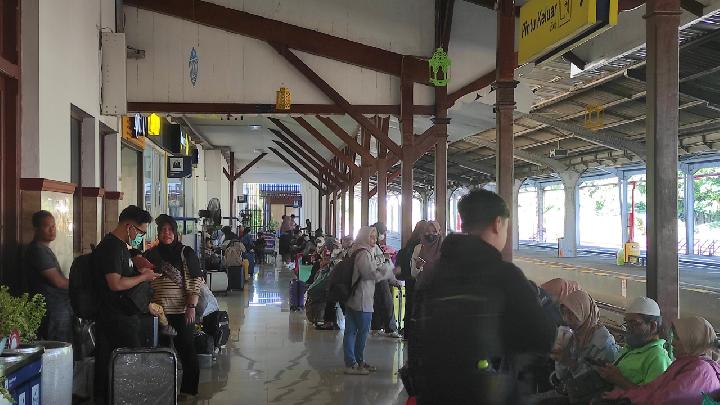TEMPO.CO, Jakarta - The Presidential Communication Office (PCO) announced that President Prabowo Subianto has formulated mitigation strategies in response to the import tariffs imposed by U.S. President Donald Trump on Indonesia.
According to Noudhy Valdryno, Deputy for Dissemination and Media Information at the PCO, President Prabowo had already anticipated potential global policy disruptions and prepared three key breakthrough measures to address them.
"In facing global challenges, including the new tariff policy of the United States, President Prabowo shows sharpness in observing geopolitical dynamics. A deep understanding of international relations and global trade becomes the main strength in maintaining Indonesia's economic stability," said Noudhy in the PCO's official statement on April 3, 2025.
On Wednesday, April 2, 2025, Donald Trump officially raised import tariffs by at least 10 percent on various countries. Indonesia ranks eighth in the list of countries affected by the US tariff increase, at a rate of 32 percent.
Noudhy explained the three breakthroughs: expanding Indonesia's trading partners, accelerating the downstreaming of natural resources, and strengthening domestic consumption resilience.
He also explained that the expansion of Indonesia's trading partners is done by applying for Indonesia's membership in BRICS (Brazil, Russia, India, China, and South Africa), an economic group that covers 40 percent of global trade.
"Indonesia's membership in BRICS strengthens various multilateral trade agreements," he said.
He mentioned that Indonesia has also signed agreements such as the Regional Comprehensive Economic Partnership (RCEP) with 10 ASEAN countries and Australia, China, Japan, South Korea, and New Zealand.
The agreement covers 27 percent of global trade and access to the Organization for Economic Cooperation and Development (OECD), covering 64 percent of global trade. Indonesia also has several other trade agreements such as CP-TPP, IEU-CEPA, and I-EAEU CEPA.
In addition to various multilateral trade agreements, Indonesia also has bilateral trade agreements with Korea, Japan, Australia, Pakistan, the United Arab Emirates, Iran, Chile, and various other countries.
In accelerating the downstreaming of natural resources, Noudhy said Prabowo prioritizes downstreaming industrial policies.
One example of downstreaming is the nickel sector, where nickel and its derivatives' export value only reached US$3.7 billion in 2014, but skyrocketed to US$34.3 billion in 2022.
Moreover, on February 24, 2025, Prabowo launched the Danantara Investment Management Agency. He stated that Danantara is designed to accelerate the downstreaming of strategic natural resources in Indonesia.
"BPI Danantara will finance and manage downstreaming projects in key sectors such as minerals, coal, oil, gas, plantations, marine, fisheries, and forestry," said Noudhy.
With these steps, he said, Indonesia not only improves export competitiveness but also no longer depends on foreign investment, creates new jobs, and stimulates sustainable resource-based economic growth.
The third major initiative focuses on enhancing the resilience of domestic consumption. Noudhy explained that this effort aims to boost purchasing power through programs that have a direct impact on public welfare.
One such program, he noted, is the Free Nutritious Meal (MBG) initiative, which is expected to reach 82 million beneficiaries by the end of 2025.
In addition, Prabowo will establish 80,000 Red and White Village Cooperatives (KDMP) aiming to strengthen village economies, create millions of new jobs, and stimulate local financial circulation.
He said this effort will not only increase domestic consumption but also reduce dependence on imports and strengthen the domestic economy.
According to him, by boosting household consumption, which accounts for 54 percent of Indonesia's GDP, this program will contribute significantly to national economic growth.
"By strengthening international trade relations, optimizing the potential of natural resources, and increasing domestic consumption, President Prabowo proves that Indonesia can continue to grow despite the uncertainty in the global situation," said Noudhy.
U.S. President Donald Trump issued a new import tariff policy called 'Reciprocal Tariffs' or abbreviated as Trump's tariffs on April 2, 2025.
This policy will impose additional tariffs on imported products from various countries, including several Asian countries, including Indonesia.
Achmad Giffary Mannan contributed to the writing of this article.
Editor's Choice: Home Economy & Business Trump's Tariffs Rattle Indonesia: IHSG and Rupiah Under Pressure
Click here to get the latest news updates from Tempo on Google News



























:strip_icc():format(jpeg)/kly-media-production/medias/4536420/original/083420500_1691948332-sdadsd.jpg)
:strip_icc():format(jpeg)/kly-media-production/medias/4992015/original/093659400_1730806799-ilish-fish-southeast-asia_1417-137.jpg)
:strip_icc():format(jpeg)/kly-media-production/medias/5069286/original/011901700_1735297294-Screenshot_2024-12-02_185733.jpg)
:strip_icc():format(jpeg)/kly-media-production/medias/5041178/original/018237200_1733711713-Screenshot_2024-12-09_at_09.31.22.jpg)
:strip_icc():format(jpeg)/kly-media-production/medias/3479243/original/096642700_1623383329-yoga_ibu_hamil.jpg)
:strip_icc():format(jpeg)/kly-media-production/medias/5034330/original/042360900_1733276293-pexels-olly-3755511.jpg)
:strip_icc():format(jpeg)/kly-media-production/medias/5031658/original/060672500_1733106828-full-shot-cute-kid-potty-training.jpg)
:strip_icc():format(jpeg)/kly-media-production/medias/5034513/original/010641000_1733283847-pexels-cottonbro-3662667.jpg)
:strip_icc():format(jpeg)/kly-media-production/medias/5065816/original/057522200_1735145557-IMG_4108.jpeg)
:strip_icc():format(jpeg)/kly-media-production/medias/4953253/original/042520900_1727310172-Downpic.cc-2315910135.jpg)
:strip_icc():format(jpeg)/kly-media-production/medias/5026707/original/083100300_1732780026-pexels-elly-fairytale-3807188.jpg)
:strip_icc():format(jpeg)/kly-media-production/medias/5072352/original/051970800_1735549513-mom-holds-little-daughter-her-arms-while-soap-balloons-fly-around-them_8353-8137.jpg)
:strip_icc():format(jpeg)/kly-media-production/medias/5050152/original/080948000_1734095606-WhatsApp_Image_2024-12-12_at_12.43.41_d12809f7.jpg)
:strip_icc():format(jpeg)/kly-media-production/medias/5059624/original/022482300_1734746051-DSC02409.jpg)
:strip_icc():format(jpeg)/kly-media-production/medias/4586104/original/077515000_1695465780-caleb-woods-VZILDYoqn_U-unsplash.jpg)
:strip_icc():format(jpeg)/kly-media-production/medias/5005252/original/023742900_1731574085-mother-little-daughter-playing-together-park.jpg)
:strip_icc():format(jpeg)/kly-media-production/medias/5102516/original/005925200_1737445029-WhatsApp_Image_2025-01-21_at_2.32.29_PM.jpeg)
:strip_icc():format(jpeg)/kly-media-production/medias/2845625/original/003656200_1562315919-Jonathan_Borba.jpg)
:strip_icc():format(jpeg)/kly-media-production/medias/2899409/original/009624100_1567411588-shutterstock_1456887869.jpg)
:strip_icc():format(jpeg)/kly-media-production/medias/4893669/original/081352500_1721187520-IMG_1379.JPG)